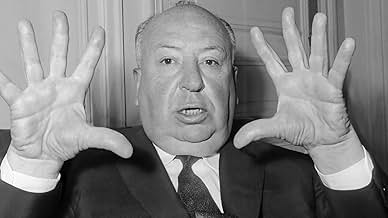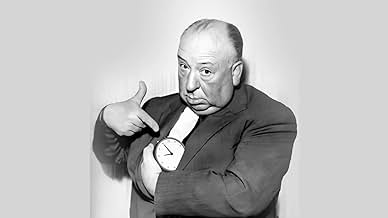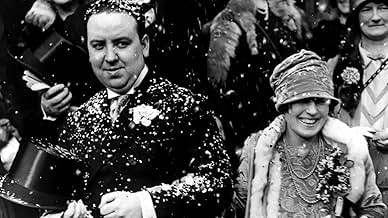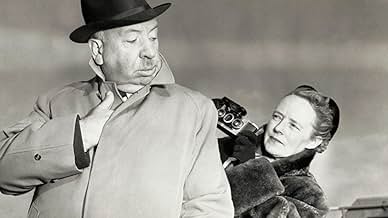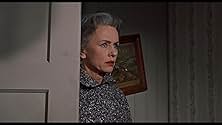AVALIAÇÃO DA IMDb
6,6/10
527
SUA AVALIAÇÃO
Adicionar um enredo no seu idiomaA fictional Alfred Hitchcock narrates an explanation of some of the lesser known cinematic techniques he used in his movies, richly illustrated with clips from his entire 50-year career.A fictional Alfred Hitchcock narrates an explanation of some of the lesser known cinematic techniques he used in his movies, richly illustrated with clips from his entire 50-year career.A fictional Alfred Hitchcock narrates an explanation of some of the lesser known cinematic techniques he used in his movies, richly illustrated with clips from his entire 50-year career.
Sean Connery
- Self
- (cenas de arquivo)
Alfred Hitchcock
- Self
- (cenas de arquivo)
Paul Newman
- Self
- (cenas de arquivo)
John Wayne
- Self
- (cenas de arquivo)
James Stewart
- Self
- (cenas de arquivo)
Julie Andrews
- Self
- (cenas de arquivo)
Grace Kelly
- Self
- (cenas de arquivo)
Bruce Dern
- Self
- (cenas de arquivo)
Cary Grant
- Self
- (cenas de arquivo)
Henry Fonda
- Self
- (cenas de arquivo)
Anthony Perkins
- Self
- (cenas de arquivo)
Shirley MacLaine
- Self
- (cenas de arquivo)
Laurence Olivier
- Self
- (cenas de arquivo)
Gregory Peck
- Self
- (cenas de arquivo)
Tippi Hedren
- Self
- (cenas de arquivo)
Janet Leigh
- Self
- (cenas de arquivo)
Ingrid Bergman
- Self
- (cenas de arquivo)
Avaliações em destaque
Really well structured and researched.
The documentary makers have delved into Mr. Hitchcock's earliest works from the silent era to his iconic "Vertigo" and "The Birds". The analysis of Alfred Hitchcock's filmmaking techniques has been broken down under titles like "Escape" and "Fulfilment". The script is in the first person and imagines Mr. Hitchcock narrating montages of his works, although repetition of the same images over and over, and the droning narration can be irritating. Nevertheless, this is a novel presentation and a valuable addition to the huge body of study of Alfred Hitchcock's works. Students of film and film buffs will certainly enjoy it. I would have rated higher except the pace is uneven and often very, very slow.
The documentary makers have delved into Mr. Hitchcock's earliest works from the silent era to his iconic "Vertigo" and "The Birds". The analysis of Alfred Hitchcock's filmmaking techniques has been broken down under titles like "Escape" and "Fulfilment". The script is in the first person and imagines Mr. Hitchcock narrating montages of his works, although repetition of the same images over and over, and the droning narration can be irritating. Nevertheless, this is a novel presentation and a valuable addition to the huge body of study of Alfred Hitchcock's works. Students of film and film buffs will certainly enjoy it. I would have rated higher except the pace is uneven and often very, very slow.
I really enjoyed this documentary. In the first place there is this remarkable choice to let Hitchcock do most of the talking. Returning from the dead (brought back just like Kim Novak in Vertigo) 4 decades after his death, convincingly voiced by an actor, it has much of Hitch's peculiar sense of humour. Much of his monologue I could remember him having said in the context of previous interviews. In particular out of the legendary book, Hitchcock - Truffaut. As a big extra you get to see what he means, while browsing scenes throughout his work, all around a set of six themes. I found this approach very refreshing. Instead of the usual chronological approach, it was refreshing to have Alfred Hitchcock as a host talking about his work intuitively. It also inspired me to watch back a lot of the director's movies. Warmly recommended!
Greetings again from the darkness. It takes a cinephile and documentarian of Mark Cousins ability to pull off such a treat for other cinephiles, especially fans of "The Master of Suspense." This felt like a two-hour geek-out that I wished would never end. Of course, the early title card that read "Written and Voiced by Alfred Hitchcock" tipped us that this would be no ordinary biopic. It's been more than 40 years since Hitchcock died (1980 at age 80), and his career spanned 1925 through 1976. His oeuvre firmly established his place among the greatest filmmakers, featuring at least eight all-time classics.
Alistair McGowan provides the voice acting that so closely mimics that instantly recognizable Hitchcock oratory prowess, and Cousins infuses the necessary sly wit that we came to expect during Hitchcock's TV work (unmentioned here). Perhaps no other filmmaker has had their film work so thoroughly analyzed over the year, and yet Cousins brilliantly adapts a new approach. He structures the analysis via 6 categories, and then proceeds to provide archival footage and film clips as 'proof' as 'Hitch' guides us through.
These categories include: 1. Escape - the segment shows various characters in different stages of trying or needing to remove themselves from a particular situation, often danger. This is the longest segment and emphasizes Hitch's use of 'opening a door' to welcome viewers inside the movie.
2. Desire - pretty much the opposite of 'escape', this reinforces the power of lust, desire, and sex to motivate a character's actions.
3. Loneliness - this segment is a mashup of loneliness, solitude, and discomfort - kind of a catch-all category of those all alone in a moment.
4. Time or Timing - the proverbial race against the clock is sometimes quite real for characters in suspense or mystery films. Cutting it a bit too close qualifies as well.
5. Fulfillment - an unusual segment in that it mentions love and then focuses on the personal life of Alfred and his wife (and collaborator) Alma. Shown are their London townhouse, their country estate outside of London, and their U. S. home in Santa Cruz, California.
6. Height - back to film analysis, we see the frequent use of going high with the camera and shooting down at the scene. It's a useful lesson in how the camera is a tool for the director.
I have purposefully not included the film titles with clips utilized for each category so as not to spoil the surprises and dull the impact. You should know that the clips fit perfectly, making this a nice film technique education, as well as a different approach to viewing Hitchcock movies. I believe the only two other directors mentioned here are Bergman and Murnau, both of whom influenced Hitchcock - just as Hitchcock has influenced so many filmmakers since. Cousins does forego any mention of the questionable persona and actions that have been associated with Hitchcock over the years, and that's likely because this documentary wants us zeroed in on techniques that make up Hitchcock films. It's difficult to imagine any Hitchcock fan not finding this to be a hypnotic experience of learning and appreciation.
In select theaters in NYC and Los Angeles on October 25, 2024.
Alistair McGowan provides the voice acting that so closely mimics that instantly recognizable Hitchcock oratory prowess, and Cousins infuses the necessary sly wit that we came to expect during Hitchcock's TV work (unmentioned here). Perhaps no other filmmaker has had their film work so thoroughly analyzed over the year, and yet Cousins brilliantly adapts a new approach. He structures the analysis via 6 categories, and then proceeds to provide archival footage and film clips as 'proof' as 'Hitch' guides us through.
These categories include: 1. Escape - the segment shows various characters in different stages of trying or needing to remove themselves from a particular situation, often danger. This is the longest segment and emphasizes Hitch's use of 'opening a door' to welcome viewers inside the movie.
2. Desire - pretty much the opposite of 'escape', this reinforces the power of lust, desire, and sex to motivate a character's actions.
3. Loneliness - this segment is a mashup of loneliness, solitude, and discomfort - kind of a catch-all category of those all alone in a moment.
4. Time or Timing - the proverbial race against the clock is sometimes quite real for characters in suspense or mystery films. Cutting it a bit too close qualifies as well.
5. Fulfillment - an unusual segment in that it mentions love and then focuses on the personal life of Alfred and his wife (and collaborator) Alma. Shown are their London townhouse, their country estate outside of London, and their U. S. home in Santa Cruz, California.
6. Height - back to film analysis, we see the frequent use of going high with the camera and shooting down at the scene. It's a useful lesson in how the camera is a tool for the director.
I have purposefully not included the film titles with clips utilized for each category so as not to spoil the surprises and dull the impact. You should know that the clips fit perfectly, making this a nice film technique education, as well as a different approach to viewing Hitchcock movies. I believe the only two other directors mentioned here are Bergman and Murnau, both of whom influenced Hitchcock - just as Hitchcock has influenced so many filmmakers since. Cousins does forego any mention of the questionable persona and actions that have been associated with Hitchcock over the years, and that's likely because this documentary wants us zeroed in on techniques that make up Hitchcock films. It's difficult to imagine any Hitchcock fan not finding this to be a hypnotic experience of learning and appreciation.
In select theaters in NYC and Los Angeles on October 25, 2024.
This film will undoubtedly become a must-watch for film students. Watching it makes it clear that Hitchcock was a true pioneer, and many filmmaking techniques originated from his creations. Also the sheer volume of work he produced was immense.
As someone who isn't a film student, I probably felt that some parts were a bit wasted on me, and I would have preferred if it ended 20-30 minutes earlier. Occasionally, it seemed like there wasn't enough source content, resulting in repetitive shots of Hitchcock's photographs.
However, apart from that, the production was excellent, and I gained valuable insights into Hitchcock's films. It is definitely more of an essay about his work than it is an insight into his person. The narration by Alistair McGowan was excellent and the film is a fitting tribute to an historic man.
As someone who isn't a film student, I probably felt that some parts were a bit wasted on me, and I would have preferred if it ended 20-30 minutes earlier. Occasionally, it seemed like there wasn't enough source content, resulting in repetitive shots of Hitchcock's photographs.
However, apart from that, the production was excellent, and I gained valuable insights into Hitchcock's films. It is definitely more of an essay about his work than it is an insight into his person. The narration by Alistair McGowan was excellent and the film is a fitting tribute to an historic man.
First, the elephant in the room is the narration. I am watching this documentary and while I do enjoy the discussion of the masters point of view on his films which is fascinating, I cannot help being manipulated somehow using the masters voice taking words obviously not written by him as if it were. For me, it is very distracting. I really been written or added to by a screenwriter in the 21st Century. Alfred Hitchcock has been dead since 1980 and there have been many articles, documentaries,filmmakers,actors, cinematographers, artists, books and scholars that have had points of view of what certain scenes meant or how they should be viewed. The shower sequence in the film, "Psycho " alone has two masters, Alfred Hitchcock and Saul Bass. This documentary answers many questions but at the same time is glaring in it's overuse of the impressionist voiceover. For many in college studying film this gimmick likely will not bother them. It is likely they have never experienced a Hitchcock film in a revival theater being projected on the big screen. For a generation watching these films on a small screen via streaming, blu ray, dvd or video it will suffice. If it's information you seek, this is filled with it. Mark Cousins has made an enjoyable film for the 21st Century. For those over a certain age who have watched the master, read or heard his interviews with Truffaut or Bogdanovich listening to the impressionist rather than hiring an actor to be a narrator rather than the master himself, I found the film a bit to distracting to give it the full due it deserves.
Você sabia?
- CuriosidadesThe only two films that are mentioned and have clips from them that are not by Alfred Hitchcock are A Última Gargalhada (1924) and Rastros de Ódio (1956).
- Erros de gravaçãoDuring a clip from "North by Northwest," "Hitchcock" mentions that Cary Grant is drinking a martini. In fact, it's a Manhattan.
- ConexõesFeatures A Última Gargalhada (1924)
Principais escolhas
Faça login para avaliar e ver a lista de recomendações personalizadas
- How long is My Name Is Alfred Hitchcock?Fornecido pela Alexa
Detalhes
- Data de lançamento
- País de origem
- Idioma
- Também conhecido como
- My Name Is Alfred Hitchcock
- Empresa de produção
- Consulte mais créditos da empresa na IMDbPro
Bilheteria
- Faturamento bruto mundial
- US$ 63.620
- Tempo de duração2 horas
- Cor
Contribua para esta página
Sugerir uma alteração ou adicionar conteúdo ausente

Principal brecha
By what name was Meu Nome É Alfred Hitchcock (2022) officially released in India in English?
Responda

![Tráiler [ES]](https://m.media-amazon.com/images/M/MV5BYWY5MTYzZTctNWFlNy00OTUwLTkwMTctOWM5M2QxOTlmMWYzXkEyXkFqcGdeQXRyYW5zY29kZS13b3JrZmxvdw@@._V1_QL75_UX500_CR0)
